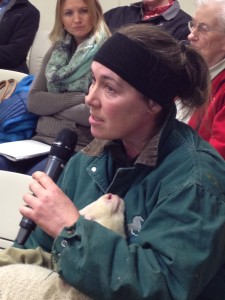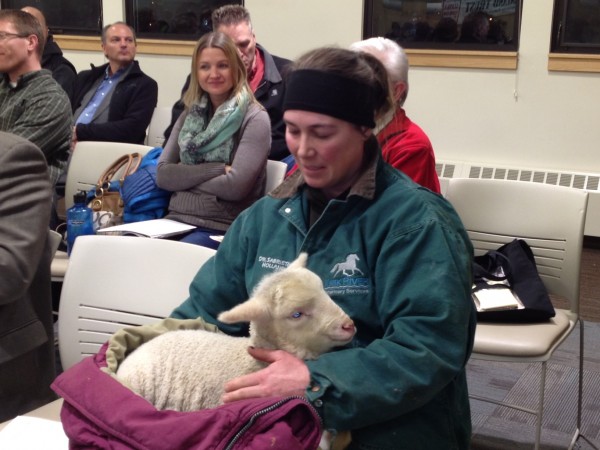Slaughterhouse shutdown prompts ag community to mobilize
Slaughterhouse shutdown prompts ag community to mobilize
By Ellen Lockyer, KSKA – Anchorage | January 14, 2016
With a tough budget session starting next week, state lawmakers are getting ready to make critical decisions. One comment often heard in discussing state revenues is “diversify the economy” to end dependency on oil money. So some Palmer ranchers says it does not make sense for state lawmakers to squash support for a home-grown Alaska industry: livestock.
Large animal veterinarian Sabrieta Holland takes the mic with a lamb in her care. Photo: Ellen Lockyer/KSKA-Anchorage.
These days, livestock ranchers in the Matanuska Valley are raising everything from American bison to Tibetan Yaks for consumers who want to know where their meat comes from. About 90 ranchers and farmers turned out for a rally on Tuesday in Palmer to raise support for legislative funding for the Mt. McKinley Meat and Sausage packing plant in Palmer. Meeting goers were encouraged to speak out.
“That’s been in business for 30 years. That’s one of the most successful businesses in the state,” said Palmer’s Robert Thom.
But Mt. McKinley depends on a state appropriation to balance its operating costs.
The plant is Southcentral Alaska’s only USDA-approved slaughterhouse, and right now, it’s neck is on the state budget chopping block.
The gist of the problem is something of a catch 22. Livestock breeders in the Matanuska Valley have worked hard to build an industry providing fresh, locally grown meat for retail sale. But unless that meat has the USDA seal, it can’t be commercially sold. And the Palmer facility is the only place within 300 miles where they can get that seal.
So livestock owners in the Valley fear that if Mt. McKinley closes its doors, their fledgling industry will die, and other local businesses will go down with it. No meat sales means fewer animals, less hay, less income for produce growers … even the Alaska State Fair’s 4H kids could take a hit. Large animal veterinarian Sabrieta Holland brought along a live lamb to illustrate her point … even veterinarians would get less work.
“This particular lamb is the first lamb born in Alaska that is due to artificial insemination trying to bring new blood into Alaska. And I’m trying to help the stock in this area build up. I do a ton of artificial insemination for local milk producers, local beef producers.”
Photo: Ellen Lockyer/KSKA-Anchorage.
Danny Consenstein, who works for a USDA agency, says the federal government has a generous loan program for farmers, but without the Valley meat packing plant, those loans won’t be approved.
“USDA is sitting on a big pile of money to support farmers and ranchers in Alaska who want to expand their herds, who want to start new operations. We’re ready. We have the largest amount of loan money that we have ever had, but it will be difficult for us to make loans to farmers and ranchers if there is no place to process their meat. ”
At its last session, the legislature approved funding for Mt. McKinley through June of this year. Amy Petit, executive director of the Alaska Farmland Trust and one of the organizers of Tuesday’s meeting, says a plan to privatize the meat plant is gaining strength.
“And we want to see it privatized. And we recognize that what we really need is the blessing from the legislature to support the governor’s budget and one more year of state funding to keep Mt. McKinley Meat and Sausage running through June of 2017, ideally.”
The Mt.McKinley Meat and Sausage plant is an asset of the state’s Agricultural Revolving Loan Fund, and state appropriations for it come out of interest on ARLF loans, not from the general fund. Last year, Mt. McKinley gained $1.6 million in income, but depended on $155,000 in state funds to meet costs.

